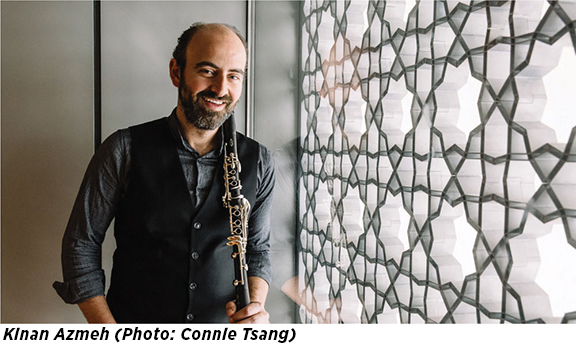Composed 2005; 9 minutes
“Many of my works have flexible instrumentation,” Syria-born, New York-based composer and clarinetist Kinan Azmeh tells me in an email interview. “I love this aspect of music making, where the music is not limited by the instruments on which it is played. Ibn Arabi Postlude exists in many versions. What we are playing with A Far Cry is a string orchestra version with piano and clarinet. The original is for single strings and optional piano or bass.”
 Ibn Arabi Postlude has been performed by Azmeh, A Far Cry and Silkroad Ensemble. Azmeh has played with the Silkroad Ensemble since 2012, winning a Grammy Award for the 2017 album Sing Me Home, on which he appears as both clarinetist and composer. “I re-orchestrated the chamber version of Ibn Arabi Postlude for full orchestra,” Azmeh says, “and then added two more movements, titling the full orchestral work Ibn Arabi Suite.” This Suite has been recorded on the album Uneven Sky by the composer with Arabic singer and the Deutsches Symphonie-Orchester, Berlin. The album won the prestigious 2019 Klassik Opus Award in Germany.
Ibn Arabi Postlude has been performed by Azmeh, A Far Cry and Silkroad Ensemble. Azmeh has played with the Silkroad Ensemble since 2012, winning a Grammy Award for the 2017 album Sing Me Home, on which he appears as both clarinetist and composer. “I re-orchestrated the chamber version of Ibn Arabi Postlude for full orchestra,” Azmeh says, “and then added two more movements, titling the full orchestral work Ibn Arabi Suite.” This Suite has been recorded on the album Uneven Sky by the composer with Arabic singer and the Deutsches Symphonie-Orchester, Berlin. The album won the prestigious 2019 Klassik Opus Award in Germany.
Kinan Azmeh’s first opera Songs for Days to Come, fully sung in Arabic, was recently premièred in Osnabruck, Germany, in June 2022 to a great acclaim. Azmeh was recently appointed to the National Council on the Arts on a nomination by President Biden.
Kinan Azmeh adds:
Ibn Arabi was an Arab Muslim mystic and philosopher, born in 1165 in Murcia, died in 1240 in Damascus. His writings have inspired me for many years. The piece is inspired by his life journey, his writings and also by a school of thought in which love and free thinking are as sacred as religious beliefs. Ibn Arabi Postlude can best be described as an obsessive ritualistic dance. It enjoys a rather circular form while maneuvering between persistent ideas and rhythms, allowing for the improvised and the composed to work seamlessly together.